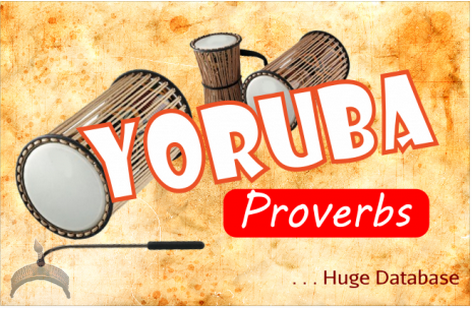Fridays are known generally for heralding our indigenous ways of life, especially in dressing and music. This is why I, as an indigene of the Yorùbá tribe presents Yorùbá Proverbs. In this post, I present a yorùbá proverb, it's literal interpretation and it's meaning and significance to the yorùbá people, and at times, Africa at large. The Yorùbá people predominantly live in the South Western part of Nigeria, and they speak the Yorùbá language. The theme for today's proverb is Pleasant Words.

Image Source
Ọ̀rọ̀ rere ló ń yọ obì l'ápò, sùgbọ́n ọ̀rọ̀ búburú á máa fa idà yọ nínú àpò.
Literal Interpretation
Pleasant words cause a person to bring out kolanut from the pocket, but unpleasant or abusive words cause a sword to be drawn out from the sheath.
The Yoruba people have a culture of deeply appreciating pleasant remarks, utterances, positive expressions of observations and balanced judgements. They therefore demonstrate this by pleasant responses in form of praises, and offering of gifts. The gift of kolanut is very indicative of deep appreciation, this is why this proverb chooses kolanut as a generic example of reward for pleasant words, or an indication of friendship. Conversely, unpleasant words are regarded as arrows meant to hurt the receiver. Hence, such words deserve corresponding reactions like drawing out a sword in defence.
The proverb is used to teach people to cultivate the habit of making positive and pleasant remarks to people and showing a positive attitude to issues rather than negative ones. It teaches that positive attitudes go a long way in strengthening bonds of friendship and in solving problems which may appear initially as very difficult. A hasty or negative reaction may further worsen such an issue.
The proverb is also used to warn people not to hurt their neighbours or other people with unpleasant and derogatory statements or actions. The yoruba people have a culture of using diplomatically pleasant words to express their feelings about unpleasant and even bitter situations. On the other hand, anyone who takes undue advantage of this good culture to insult them will have a sharp and bitter reward without apology.
Please drop your contributions about this proverb in the comment section. I will love to know your views.
Thanks for using eSteem!
Your post has been voted as a part of eSteem encouragement program. Keep up the good work! Install Android, iOS Mobile app or Windows, Mac, Linux Surfer app, if you haven't already!
Learn more: https://esteem.app
Join our discord: https://discord.gg/8eHupPq
Downvoting a post can decrease pending rewards and make it less visible. Common reasons:
Submit
Congratulations! This post has been upvoted from the communal account, @minnowsupport, by tolustx from the Minnow Support Project. It's a witness project run by aggroed, ausbitbank, teamsteem, someguy123, neoxian, followbtcnews, and netuoso. The goal is to help Steemit grow by supporting Minnows. Please find us at the Peace, Abundance, and Liberty Network (PALnet) Discord Channel. It's a completely public and open space to all members of the Steemit community who voluntarily choose to be there.
If you would like to delegate to the Minnow Support Project you can do so by clicking on the following links: 50SP, 100SP, 250SP, 500SP, 1000SP, 5000SP.
Be sure to leave at least 50SP undelegated on your account.
Downvoting a post can decrease pending rewards and make it less visible. Common reasons:
Submit